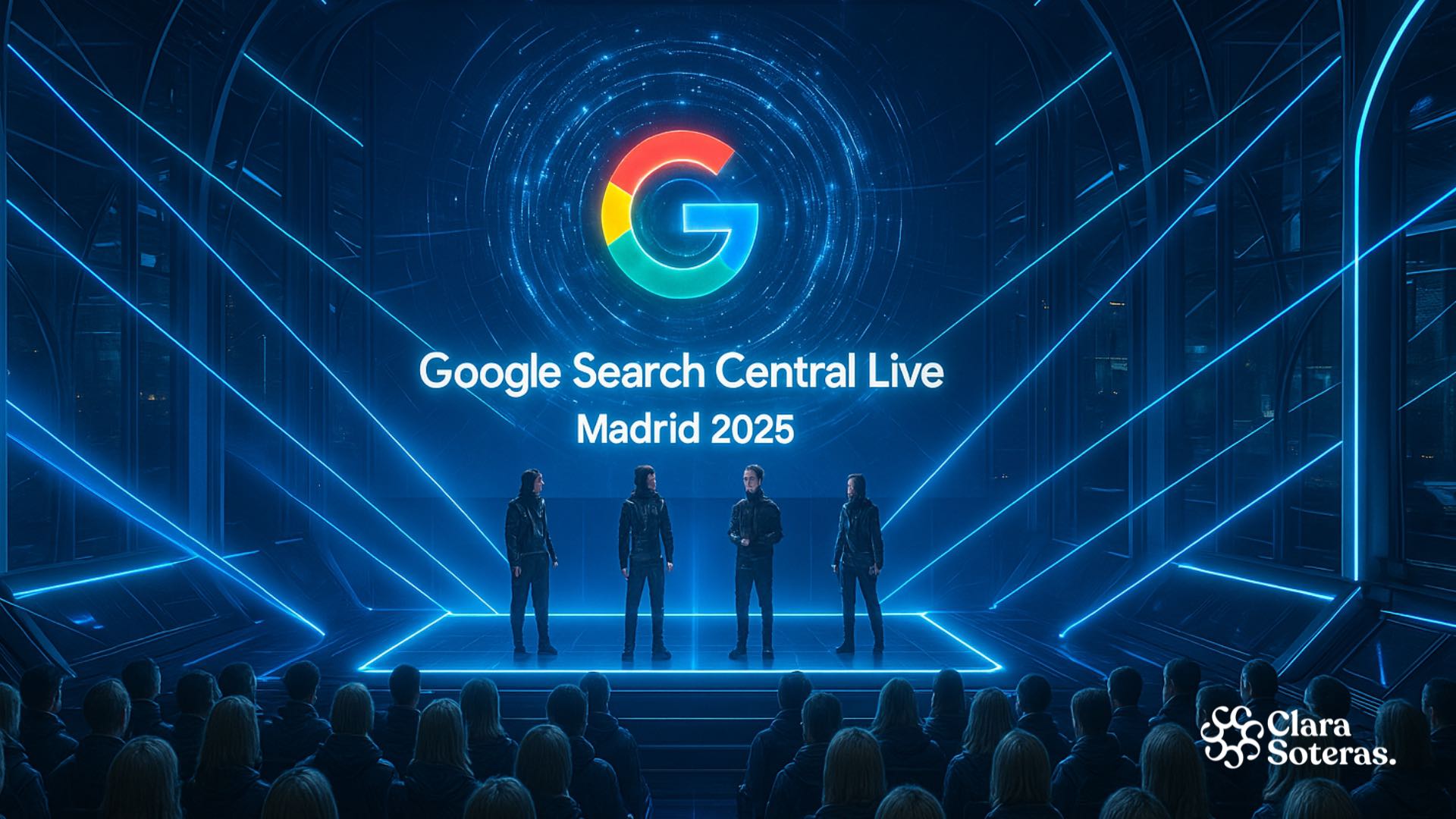Google events always generate major buzz within the SEO community, and it’s no surprise that the organizers received ten times more requests than the venue could hold for the very first Google Search Central Live held in Spain—specifically in Madrid. In fact, SEO professionals and search marketing experts working in the country were (understandably) in a frenzy when we saw the tweet, scrambling to register as quickly as possible to secure one of the coveted seats at the Google for Startups Campus auditorium on Manzanares Street in Madrid.
¡Qué Gran Noticia! El Google Search Central Live llega a Madrid 🤩🇪🇸 Acabo de solicitar registro 🙌 Regístrate tu también 👇 https://t.co/qcet37ztcA Muchas gracias 🙏 @googlesearchc pic.twitter.com/l9xHDk3OyV
— Aleyda Solis 🕊️ (@aleyda) March 5, 2025
Google anuncia un Search Central Live este próximo 9 de abril en Madrid.
— Carlos Ortega (@carlos_darko) March 5, 2025
En él se tratarán:
1️⃣ SEO: cuáles son las mejores prácticas para ser exitoso y triunfar en la Búsqueda de Google
2️⃣ Search Console y Google Trends: cómo utilizar datos de la Búsqueda para mejorar… pic.twitter.com/wZjURAcG5b
La semana que viene asistiré al Google Search Central Live Madrid 2025. Si tenéis alguna pregunta para Google, dejádmela por aquí y la trasladaré en el evento. A ver si con un poco de suerte nos la responden 😅 pic.twitter.com/ZtFDcwnVvu
— Natzir (@natzir9) April 2, 2025
As you can see, the hype was already there. What would people be talking about? What new developments would be presented? What international speakers would attend? And most importantly, who would be chosen to attend this first Spanish gathering? As the days went by, we could see that the event agenda hinted we’d get some updates on topics and issues related to publishers, content, and news, and of course, on AI. Because yes, with AI Overviews fully rolled out just two weeks earlier in Spain and other European countries, it was expected to be one of the central topics of the day.
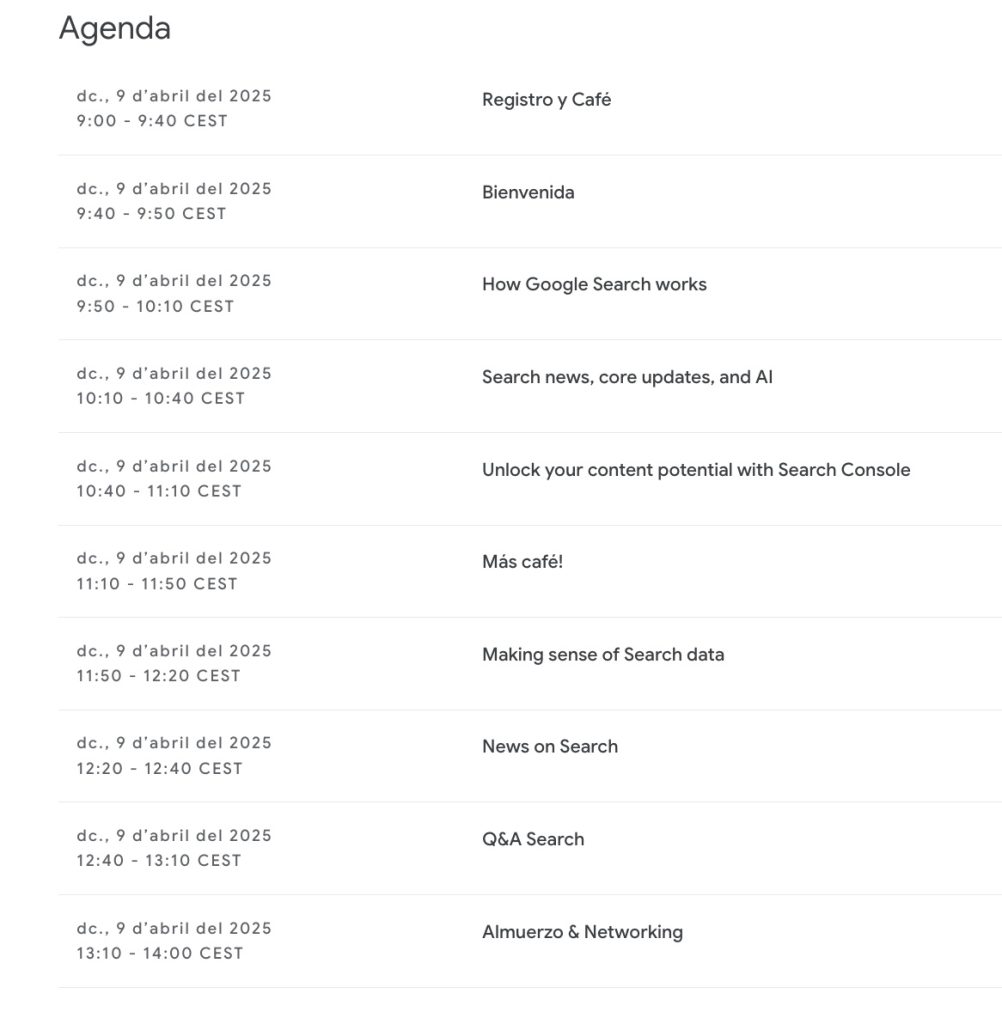
“Anticipate the future, don’t look in the rearview mirror”
The event kicked off with a clear statement of intent from the Google team and a brief, yet insightful and thought-provoking talk by Lino Cattaruzzi (Managing Director Iberia, VP Google), aimed at understanding how search will evolve, how Google sees it, and what their goals are for the coming years. Cattaruzzi emphasized that the company (and its search engine, algorithm, and all its products) is focused on the user and how their behavior is changing when it comes to searching or interacting with platforms. “What worked for them in the past won’t work in the future. Think about how users are changing. Anticipate the future, don’t look in the rearview mirror.” Cattaruzzi added that they are constantly learning how users engage with and behave around AI Overviews in order to give them what they want: “The focus is on the user.” That much was clear.
They also reinforced their commitment to cybersecurity, mentioning the center that Google opened in Málaga a year and a half ago and the projected +8% increase in Spain’s GDP over the next ten years, which they aim to achieve through planned investments in actions related to the development and application of artificial intelligence.
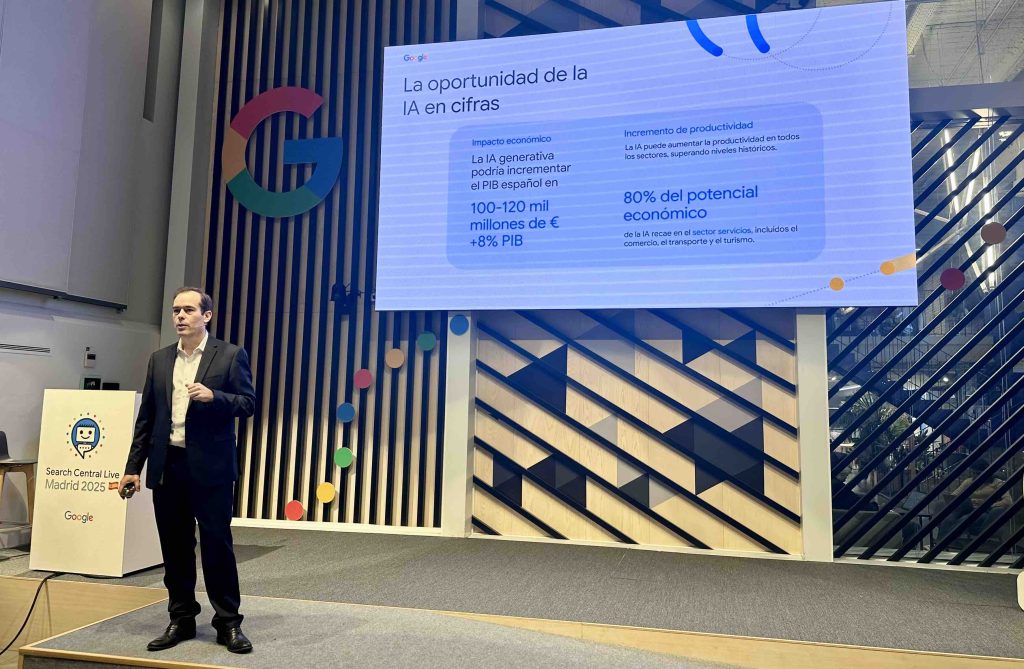
Later on, there were other talks, including one by Nikola Todorovic, Engineering Director at Google, who showed attendees one of Google’s most well-known videos about how the search ecosystem has evolved from its beginnings in 1997 to the present day. He also covered the development and integration of the various SERP modules we know today, as well as product advancements related to the algorithm that the company has continuously worked on to deliver more information to users without them leaving the interface: the Knowledge Panel, Featured Snippets, Rich Snippets, and even ads. Todorovic emphasized: “Search has evolved to meet information needs while continuously providing value to the web.”
He’s the rock star: John Mueller takes over the stage with some food-related controversy
He’s always one of the most anticipated figures at any Google event, and this time we were lucky to have him as one of the speakers in Spain. John Mueller is Mick Jagger — the rock star of the company. You only had to see how everyone lined up to take a photo with him during the coffee break. His talk was titled “Search news, core updates, and AI.” A moment of peak anticipation in the room. Mueller, Google’s Search Relations Team Lead, shared some figures to provide context on the massive number of changes the algorithm undergoes each year. He mentioned over 16,800 live experiments and more than 719,000 search quality tests, leading to over 4,700 actual changes implemented in a single year (data from 2023, though he noted the numbers were similar in 2024).
As the Google team always does at these events, they spotlight local cuisine and try to connect with the audience through this great culinary metaphor. This time, Mueller chose paella to explain the different core updates, but… none of them really convinced the audience (just like the core updates themselves). The controversy was on — especially with Valencians in the crowd ;). After all, we all know paella isn’t experienced or understood the same way throughout Spain, and speaking with people from Madrid at the event, it’s fair to say it’s not exactly the city’s most traditional dish either. Since I’m not in the mood to spark a debate about paella, next time let’s ask him to bring some good Swiss cheese straight from Google’s headquarters in Zurich — in exchange for a bit of top-quality acorn-fed Iberian ham.
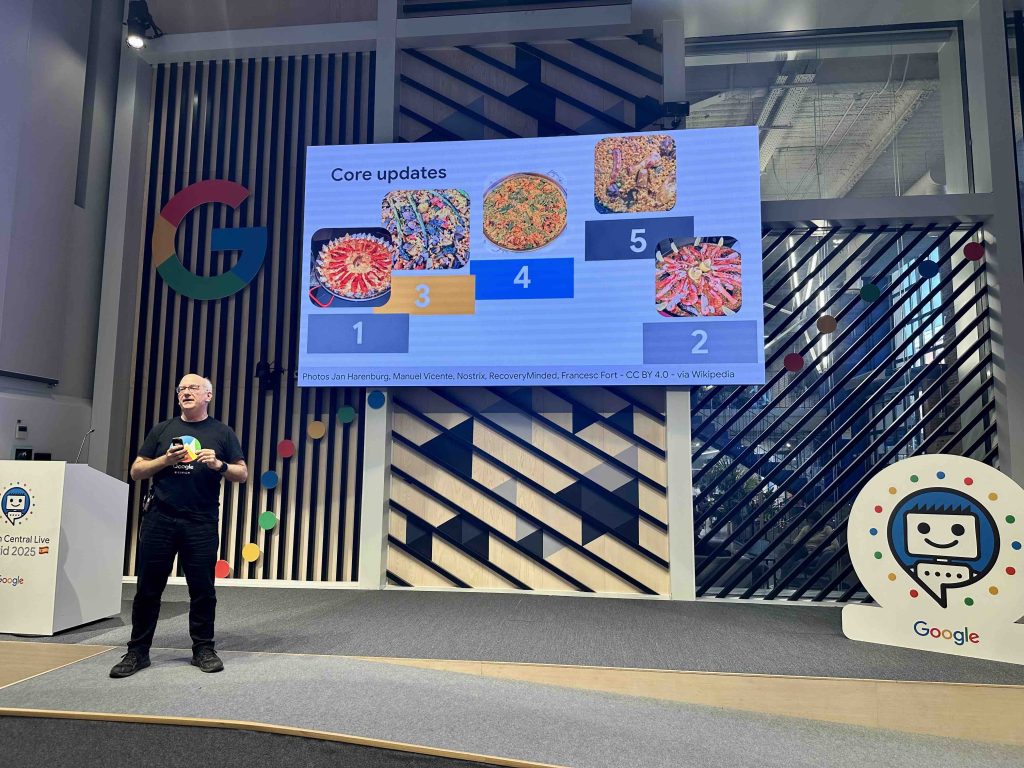
Mueller once again presented the Search Quality Rater Guidelines and emphasized the importance of meeting users’ needs through best practices, highlighting the much-discussed E-E-A-T as a key factor in evaluating page quality. He pointed out that “sites whose main content is automatically generated or AI-generated will rank worse”, something that was recently added to the document.
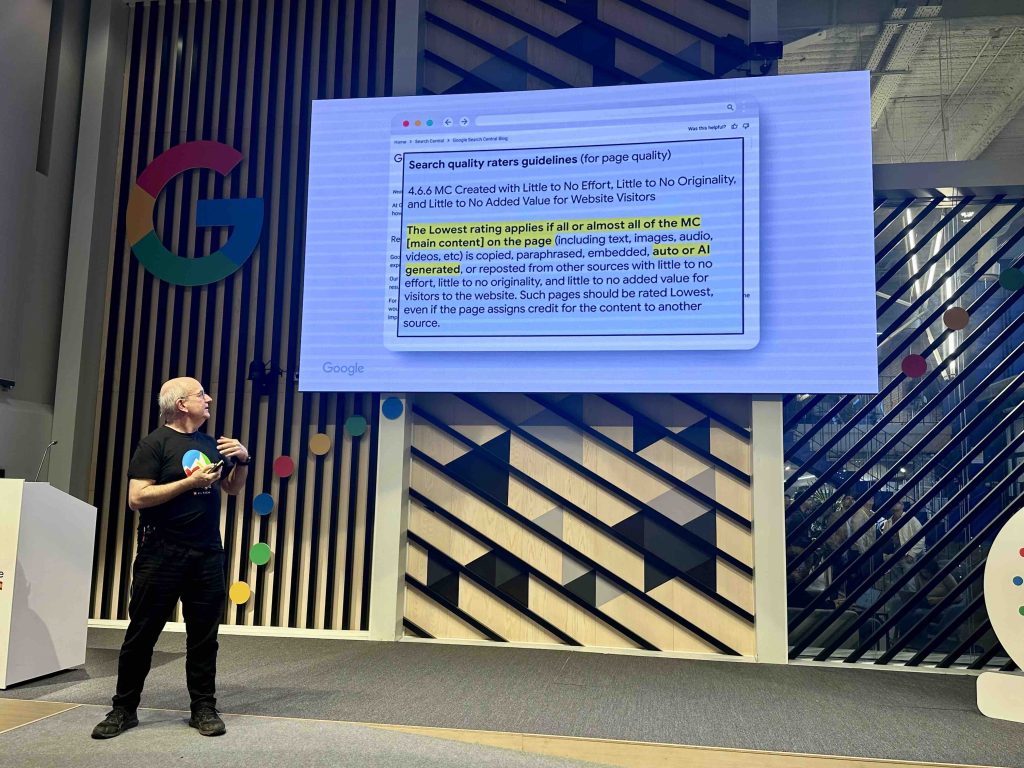
What is reputation abuse and what isn’t and how to fix a manual penalty from Google?
John Mueller also took time to explain what Google considers reputation abuse (Site Reputation Abuse) in light of the recent manual penalties that have affected some content creators and major media outlets across different countries. The rock star clarified that this type of content is typically created by third parties and is designed to “take advantage of the ranking signals associated with the host site.” He emphasized that freelance content isn’t automatically considered reputation abuse and that “manual actions are based on the behavior of the site itself, not on who created the content.”
At this point, John Mueller explained how to fix a manual penalty received in Google Search Console for any website. He said the recommended approach is to block (noindex) or remove the content, or host it on a different domain (using nofollow links, without redirecting, and without moving the content to a subdomain). After that, you can submit a reconsideration request. That said, let me point out an important detail: not all manual penalties are the same. In fact, when a penalty is issued for “misleading content”, the notification and alert message in Google Search Console clearly specify that you should not delete the content, but rather fix it.
Finally, Mueller also explained how to block AI Overviews using the robots.txt directive, though it’s worth noting that this won’t stop them from appearing altogether. It simply prevents your site from showing up in that feature — meaning a competitor might show up instead, so keep that in mind. On the other hand, he also clarified that there’s no need to apply any specific optimization in order to appear there. For now, some data related to AI Overviews will be visible in Search Console, but grouped together as a single element. We won’t have access to individual link data, positions, impressions, or clicks broken down separately.
Cómo manejar los snippets de AI Overviews y cómo enfocar el “nuevo SEO” respecto a estos fragmentos de IA #sclmadrid pic.twitter.com/8XppH7zaaU
— MJ Cachón (@mjcachon) April 9, 2025
The big announcement for SEO for News: Google Discover is coming to desktop
After several talks, the big announcement for media SEOs arrived. Eric Barbera, News Product Planning and Go-to-Market at Google, progressed through his presentation titled “News on Search” — until he showed a screenshot that he didn’t directly mention in his speech. But yes, all of us in the audience were looking at a screenshot of Google Discover on desktop, under the title “expanding surfaces.” Barbera was announcing the expansion of Google Discover to desktop, a test we had seen a long time ago from a user in India, but that was never officially launched. This could represent a major shift for media outlets and content creators, considering that Discover is currently the channel driving the most traffic to news sites — more than Search, direct traffic, or social media, obviously.
Whenever I mention that over 50% or even 60% of a news site’s total traffic comes from Discover to SEOs who don’t usually work with media, they’re shocked — but yes, this is where we are now. And this announcement could mark a major shift, one we’ll need to watch closely to see when and how it will align with AI Overviews. It’s true that 90% of media traffic currently comes from mobile, but we’ll have to see how this affects the balance, as well as how optimization strategies will need to change for desktop — since long headlines that hide entities with ellipses or oversized images may not work the same way if the layout differs on desktop. We might end up needing to optimize Discover for two different versions. Looks like we’re in for an interesting ride.
Google Discover will be available for desktop!🤩
— Clara Soteras (@ClaraSoteras) April 9, 2025
The Google team is working to expand Discover on more surfaces. They just showed it in #sclmadrid, a great new feature for News and that will change the real-time and content strategy of publishers.
Let’s remember that, right… pic.twitter.com/gw7SSwZ8ES
Following this announcement — which was picked up by many media SEOs internationally, including Lily Ray and John Shehata — the news quickly went viral. In fact, John Shehata, CEO and founder of NewzDash and GDdash, a platform for analytics and tools to monitor Discover performance, shared updated data from Q1 2025. He compared traffic from Google Search and Google Discover across more than 400 media outlets, revealing that Discover has a click-through rate four times higher than Search, despite having only half the number of impressions. It became the most talked-about reveal during the post-event networking session, especially among the many audience and SEO professionals who works on news and for publishers in attendance.
Holy moly… https://t.co/K8G7CitIUO
— Lily Ray 😏 (@lilyraynyc) April 9, 2025
Before making the big announcement, Eric Barbera also showcased the different ways news and articles can rank across various modules, such as Top Stories, local news, or videos. He also highlighted the importance of having strong structured data, as well as the seven ranking factors for news content — useful to keep in mind, though nothing particularly new or that hadn’t been explained before. These factors are: relevance, location, prominence, authority, freshness, usability, and interests.
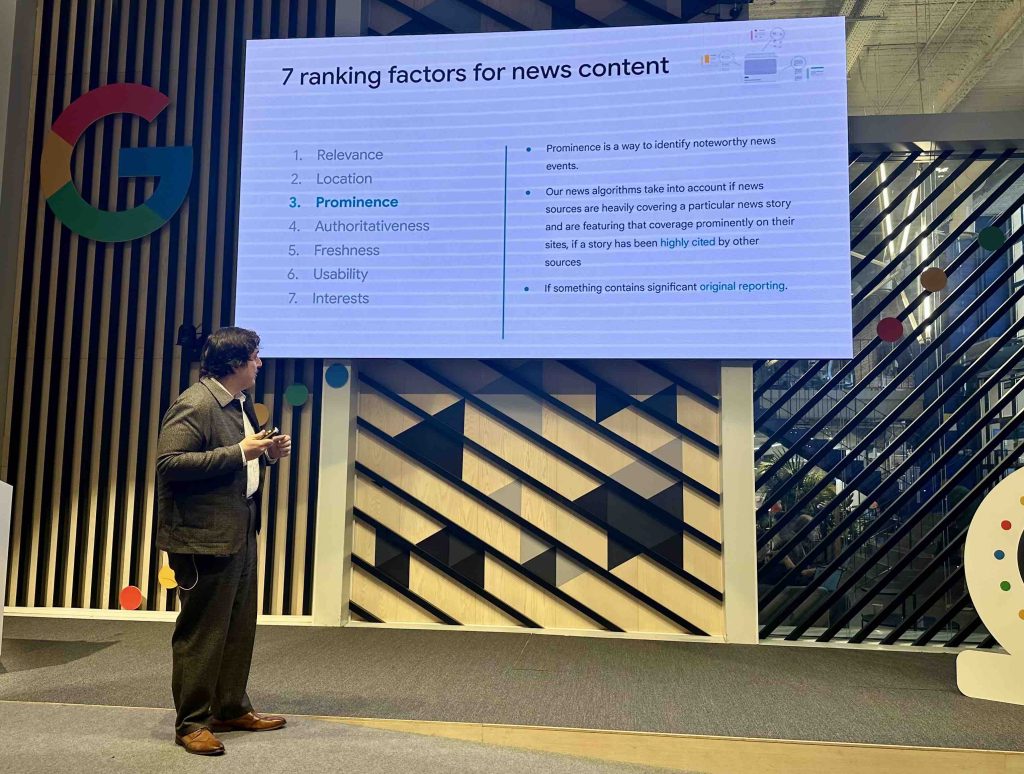
Analytics and Search Console: Search Console API now available with data from the past 24 hours
This was another major announcement of the day. Moshe Samet, Search Console Product Lead, introduced it in a brief talk that served to announce that, as of that moment, the Search Console API could now be used to access data from the past 24 hours. This is especially valuable for those working in real-time, allowing them to track same-day changes, optimize on the fly, or monitor projects that require immediate checks — without having to wait for Google to re-crawl the site and update the data in the platform.
Finally, Daniel Waisberg, Search Advocate at Google — another regular at company events and a favorite for fan photos — gave a talk explaining the differences in data across various Google products like Google Trends, Google Analytics, and Google Search Console, a topic also highlighted by MJ Cachón with a great question that many people often wonder about.
¿Por qué no coinciden los datos de GA y los de GSC?
— MJ Cachón (@mjcachon) April 9, 2025
– implementaciones incorrectas
– cookies
– modelos de atribución
– tráfico de bots
– páginas no HTML
…#sclmadrid #seo pic.twitter.com/HHJ24gBo7K
The event wrapped up with an open Q&A session that was anything but brief, which was much appreciated. Attendees had the chance to ask live questions to the speakers after three pre-selected questions chosen by the Google team. It’s true that not all the answers fully satisfied the audience, which had many questions related to the future of AI Overviews, their impact on search, and the possibilities for tracking and monitoring them in order to continue working on and understanding SEO. Still, the final takeaway was clear — and it’s the same one they always emphasize: “Create content for users, not for search engines.”
This first meetup with Google in Madrid not only gave us plenty to talk about, but also offered the MujeresEnSEO community the chance to come together again and be present at an SEO event. As you can see in the photo, our numbers keep growing (and this is just those of us who were there).
#MujeresEnSEO siempre presentes. #searchcentrallivemadrid pic.twitter.com/l5C3CU0x2W
— MJ Cachón (@mjcachon) April 9, 2025
I hope you enjoyed this event recap, especially for those of you who couldn’t be there in person, and if you’d like to dive deeper and explore more technical details, as well as see more images of everything that was shared, I invite you to check out this livestream by MJ Cachón, SEO consultant and director of Laika, which I had the pleasure of joining the following day. She shares more screenshots and we talk openly about the entire session. Thanks so much for reading this far, and I’d love to hear your feedback if you’re up for it and feel like sharing this article! I’d be happy to keep the conversation going on social networks. See you next time!
